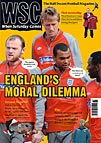 John Chapman looks at how enduring financial problems have finally bankrupted a top-flight Belgian club
John Chapman looks at how enduring financial problems have finally bankrupted a top-flight Belgian club
The francophone Belgian city of Mouscron is close to both the country’s border with France and the linguistic boundary with Dutch-speaking Flanders. Its football club, Royal Excelsior Mouscron, has drawn fans from all three communities. Entering the First Division in 1996, Mouscron never challenged for the title but introduced some useful players, most notably the Mpenza brothers, Émile and Mbo.
It was therefore something of a calamity for the region when Mouscron were expelled from the League for financial reasons on December 28, 2009. With the club gone, the players became free agents. Some found clubs, 17-year-old Maxime Lestienne joined Club Brugge, while others are still looking.
But it was not only their players and fans that suffered. Following the collapse, all points gained by other clubs against Mouscron in the current season were deducted. The big losers were Lokeren who had taken six points from Mouscron. Their president Roger Lambrecht blamed the League for Mouscron’s collapse and threatened to take them to court in the event that his team were relegated.
But how could a First Division football club find itself in such dire straits? Rewind to the arrival of Jean-Pierre Detremmerie and Philippe Dufermont, both sons of Mouscron. Of the two, Detremmerie is the main man. In his time, he has been the mayor of Mouscron, the head of IEG (the region’s utility provider), a major player in local politics and football club president. Detremmerie was in charge when the club got promoted to the First Division and immediately won a place in Europe, propelled there by the Mpenza brothers’ goals.
The charismatic Detremmerie believed that a successful club could help put the city on the map. Working towards that goal in 1999 the club started by demolishing its main stand and installing executive boxes, business seats and top-of-the range facilities. For a club with a ground capacity of 10,000, this was a risky business.
In 2005, the club was already experiencing financial difficulties and Detremmerie resigned as president. While still exercising his other powerful functions, Detremmerie sought help from Philippe Dufermont, a businessman with extensive interests in Spain. Dufermont bought an ex-supermarket complex from the city of Mouscron (where Detremmerie was still mayor) for €600,000 (£525,000) – but the money was paid into the accounts of the football club. This allowed the club to gain its licence to continue playing in the First Division.
That transaction is still in the hands of lawyers but the club also owed millions of euros to IEG, to the tax and social security authorities and to the city of Mouscron for apartments rented to players. Millionaire Dufermont decided to take on the club’s burdens and became the Mouscron’s main sponsor and later – in 2007 – its president. Initially talking of “Europe in two years’ time”, he reputedly injected €8m into the club. In 2008, saying he needed to spend more time out of the country, Dufermont stepped down in favour of his cousin, also called Jean-Pierre, but returned a year later. There was talk of money being invested in the club from Saudi Arabia, Russia and Australia – all came to nothing. Before the start of 2009-10, Mouscron applied for a First Division licence once again and, remarkably, received one. Hence the resentment felt by Lokeren president Roger Lambrecht.
Coaches came and went, including Belgian playing legend Enzo Scifo and Amedeo Carboni, previously of Valencia and Roma. Carboni, a friend of Dufermont, brought over many Spanish players whom the club could not afford. Lille and Spurs were both said to be interested in using Mouscron as a feeder club. Following an audit by Deloitte, all interested parties withdrew from the discussions. The club placed its last hopes on ex-player Demba Ba leaving Hoffenheim for Stuttgart, a transfer that would have earned €1.8m for Mouscron – a failed medical was the last nail in the coffin. With financial pressures mounting – primarily from the tax and social security authorities – players went on strike. After the club failed to fulfil three consecutive fixtures, the game was over.
This being Belgium, however, there’s always a solution – or a compromise – waiting in the wings. This came in the shape of Third Division club – Royal Racing Club Péruwelz. Following amalgamation under the name of FC Mouscron-Péruwelz, a new club will play matches in the Belgian Third Division in the 2010-11 season at Mouscron’s ground – Le Canonnier. Mouscron’s nickname is Les Hurlus (roughly translated, mercenaries) and they are on the move again.
From WSC 277 March 2010